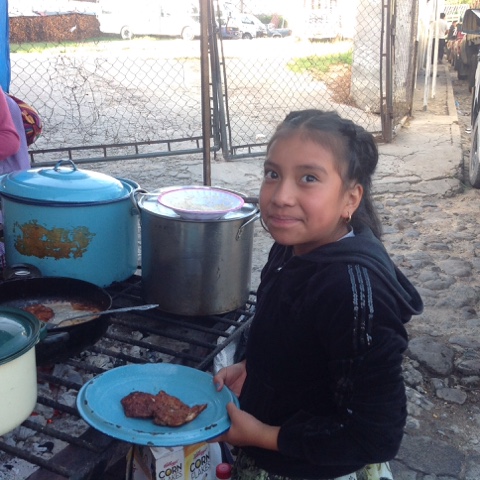Yesterday I hiked up to Cero de la Cruz to begin a walking tour of the city. I felt so footloose to set out on my own while my friends did their shopping that I walked at a brisk clip, getting a modicum of exercise for the first time in days. Oh joy!!
 These are the ruins of the Iglesia de la candelaria, just extraordinary...
These are the ruins of the Iglesia de la candelaria, just extraordinary...
 Then, there is the Iglesia de nuestra señora de la Merced, a church that looks more like a birthday cake than a church.
Then, there is the Iglesia de nuestra señora de la Merced, a church that looks more like a birthday cake than a church. This is one of my favorite depictions of the textures and colors of Guatemala,the bus at the side giving an indication of the festive painted decorations on the busses. Color is everywhere, and j think it works here because the temperature is so ambient, the humidity so low. A brilliant blue and a hot pink are not going to make the viewer swelter.
This is one of my favorite depictions of the textures and colors of Guatemala,the bus at the side giving an indication of the festive painted decorations on the busses. Color is everywhere, and j think it works here because the temperature is so ambient, the humidity so low. A brilliant blue and a hot pink are not going to make the viewer swelter.
 These are the ruins of the Iglesia de la candelaria, just extraordinary...
These are the ruins of the Iglesia de la candelaria, just extraordinary...
 Then, there is the Iglesia de nuestra señora de la Merced, a church that looks more like a birthday cake than a church.
Then, there is the Iglesia de nuestra señora de la Merced, a church that looks more like a birthday cake than a church.This arco de Santa Catalina was used so that nuns could cross the street without being seen when this was a convent in the 17th century. Now it is a very fancy hotel.
 This is one of my favorite depictions of the textures and colors of Guatemala,the bus at the side giving an indication of the festive painted decorations on the busses. Color is everywhere, and j think it works here because the temperature is so ambient, the humidity so low. A brilliant blue and a hot pink are not going to make the viewer swelter.
This is one of my favorite depictions of the textures and colors of Guatemala,the bus at the side giving an indication of the festive painted decorations on the busses. Color is everywhere, and j think it works here because the temperature is so ambient, the humidity so low. A brilliant blue and a hot pink are not going to make the viewer swelter.This morning we meet with an expert in Eco filters which are being used in three rural areas where people are sharing the filters to cut down on sickness and death as a result of polluted water supplies; however, without more supervision and better funding, these programs srr difficult to oversee and support. I put a photo of my elegant breakfast because it was so beautiful when the light hjt those huevos rancheros that I was compelled to photograph the . Also, I want to document that Guatemala is not completely diabetes drive .
Finally, we ate at a restaurant called Frida's last night where they were having a two for one special on margaritas, and I think anyone in her right mind would accept the challenge. I believe tequila may be the new champagne! Stand back, neighbors!!
Tomorrow is our last day, and we go to Guatemala City, flying home Thursday. I have loads to digest, to research and to write as I ponder the eternal questions about mission work and volunteerism.














































